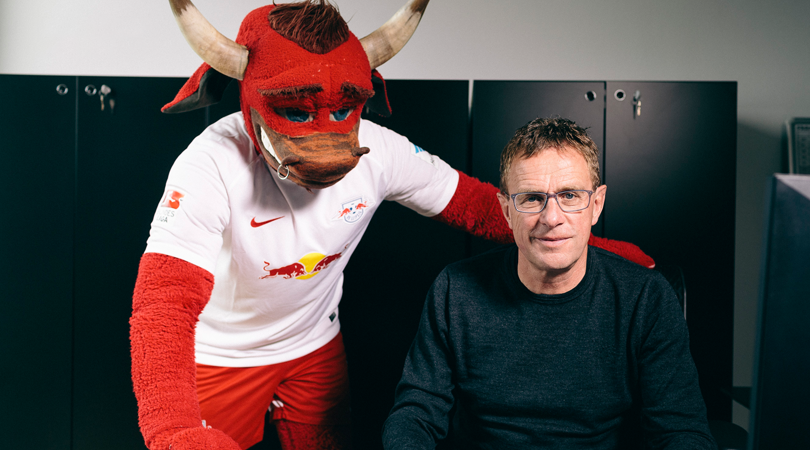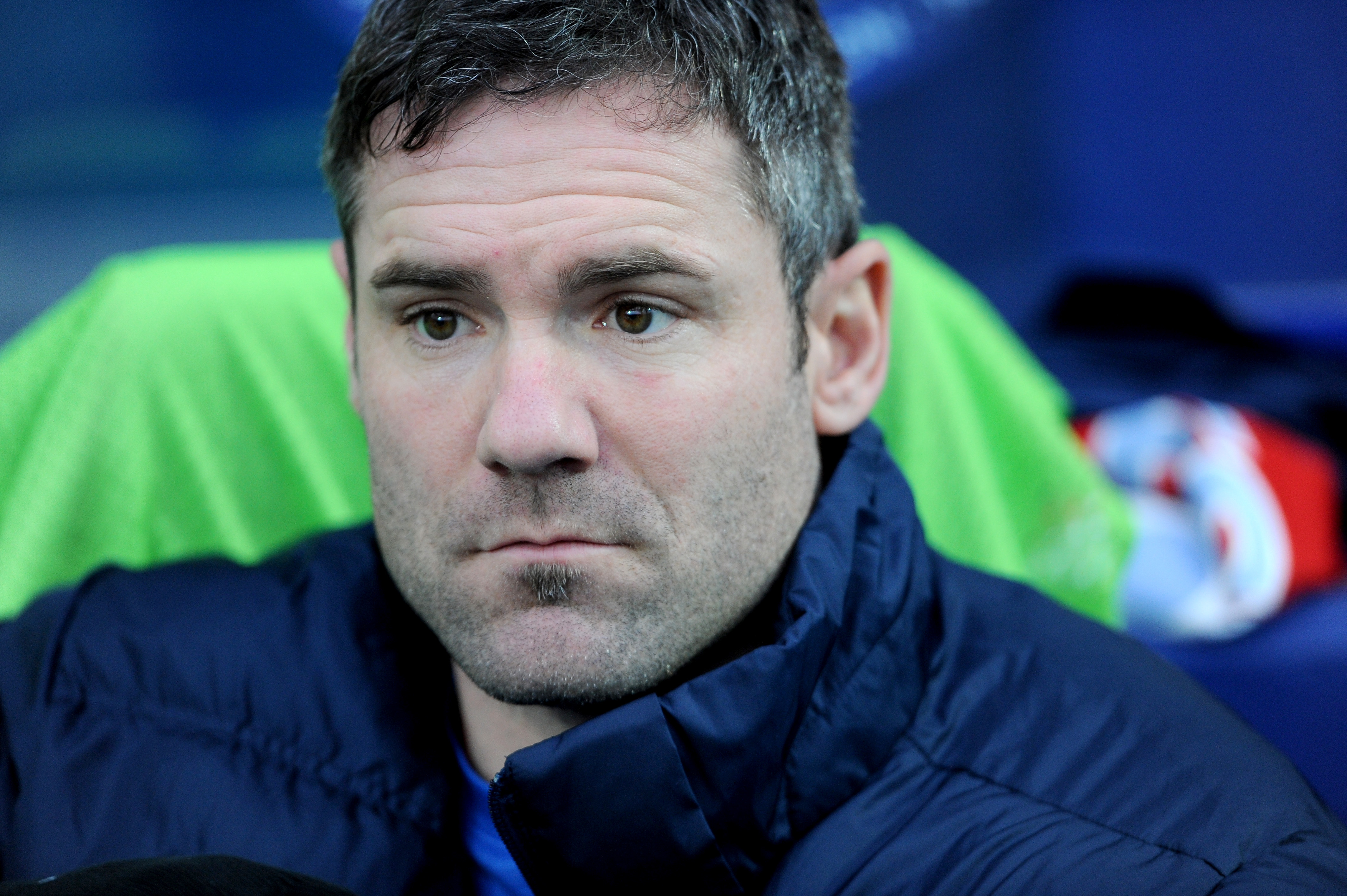How Ralf Rangnick became Manchester United's new manager – via Sussex, the England job, Jamie Vardy... and fake astronaut news
FFT visited Ralf Rangnick when he was sporting director at RB Leipzig in 2017 – and learned much about the incoming gaffer at Old Trafford

This interview with Ralf Rangnick originally appeared in the July 2017 issue of FourFourTwo. Subscribe today and save 50% as part of our Black Friday offer.
For Ralf Rangnick, life these days is rarely dull. Less than 12 months ago, he was at Wembley being interviewed for the England manager’s job. Now he’s in his office in Leipzig, denying suggestions that he nearly became an astronaut, while sat beside a man who’s dressed up as the world’s most mischievous bull.
“Danke schon, Bulli,” Rangnick chuckles as RB Leipzig’s smirking and nose-ringed mascot departs with a fist bump for FourFourTwo, having dropped by to greet us on our visit to the club that delivered one of the most surprising stories of 2016-17 – finishing second in the Bundesliga.
NEWS Manchester United agree deal with Ralf Rangnick to become interim, according to reports
Rangnick has proved the mastermind behind the Bulls’ progress this term, so FFT have flown to Germany to spend a week finding out how he’s made it happen and hear some tales about an amazing life and career. Wikipedia reports that the man known as ‘The Professor’ was once an accomplished astrophysicist – claims later echoed by several newspapers – with online sources asserting he was shortlisted to join Germany’s space programme. Yet, this is all news to the man himself.
“I’ve got nothing to do with science!” he laughs. “I studied English and PE at university – and I wanted to become a teacher.”
Instead, he became one of football’s most influential men. Rangnick may not be that well known outside of Germany, but this is the man who popularised the modern pressing game and the man who wrote the manual from which Jurgen Klopp & Co. followed. He is also the man who took Hoffenheim from third-tier obscurity to the top of the Bundesliga in two and a half years. Now they, like Leipzig, have sealed a maiden Champions League qualification.
The best features, fun and footballing quizzes, straight to your inbox every week.

Rangnick is also the man who guided Schalke to the Champions League semi-finals for the only time in their history. And when he’d done that, he set about guiding RB Leipzig from the fourth tier to the Bundesliga, and an astonishing debut campaign when they were the only team to ever really rival Bayern Munich.
With a CV as good as that, perhaps it’s not entirely surprising that he received a phone call last summer, not long after England’s loss to Iceland at Euro 2016. Roy Hodgson had stood down. FA technical director Dan Ashworth wanted Ralf to head to Wembley for a chat.
“Dan first contacted me in 2012 and invited me to an interview at West Bromwich Albion,” the 58-year-old says. “He offered me the job but I knew he was probably going to join the FA, so I turned it down. After the Euros, he called me again and asked if I would come for an interview for the England job. I said, ‘How realistic is that?’ He said that if it was up to him it would be very realistic, but that there were some other people on the board who’d also have a say, and a few of them thought it should be an Englishman. Of course, that’s normal. Three days after I went for the interview, they informed me that Sam Allardyce would be taking over as manager.”
Back in 2012, when the opportunity arose to succeed Hodgson at The Hawthorns (Steve Clarke was eventually appointed), another offer was also on the table. It was from Red Bull’s supremo Dietrich Mateschitz. Initially, Mateschitz wanted Rangnick to become the new manager of Red Bull Salzburg. Rangnick wasn’t keen, so Red Bull returned with a second proposal: to become the sporting director of not one but two football clubs: Red Bull Salzburg as well as RB Leipzig. The latter had been founded three years earlier after Red Bull bought SSV Markranstadt, a tiny team from a town a few miles outside Leipzig. The new Leipzig had just been promoted from the German fifth tier, but then spent a couple of seasons unsuccessfully trying to secure promotion to the third division.
ER, WHAT? Eric Cantona 'confirms' his appointment as Manchester United manager
“I decided to accept the offer as it was a new experience,” Rangnick says. “For three years I was sporting director of two different clubs in two different countries. All of the travelling was not so easy, so in 2015 I decided to put my full focus just on Leipzig.”
So what does a sporting director actually do? Well, quite a lot, as it happens. When FFT visit, his first appointment of the day is first-team training: the players have gone through their warm-up routines and are about to start the proper session when Rangnick leaves his office overlooking the pitch and wanders out onto the grass. He shakes hands with his staff but seems content to stand and watch in the background while manager Ralph Hasenhuttl puts the players through their paces. The 49-year-old Austrian took charge at the start of the 2016/17 campaign after Rangnick had stepped in to coach the side during the 2015/16 season, securing promotion to the top flight.
“That was an emergency situation!” Rangnick laughs now. “We had spoken to Thomas Tuchel, who decided to manage Borussia Dortmund instead, and we also spoke with Ralph Hasenhuttl, who had just won promotion with Ingolstadt. However, he called me up and said, ‘Sorry, it’ll break my heart if I have to leave this club’. It would have been the number three or number four solution for a new coach, so I said to my wife that I’d have to do it for a season. Hopefully we would then get to the Bundesliga and convince the right man – which is what happened with Ralph.”
Hasenhuttl swiftly led Die Roten Bullen to top spot in the Bundesliga, a remarkable achievement that surpassed everyone’s expectations in the summer. “We were quite optimistic we could enjoy a trouble-free season, but nobody expected where we have finished up,” Rangnick says. “It’s sensational what has happened.”
Even more so when you consider the lack of household names in the first team. The club invested in players in 2015, but almost all of the arrivals were little known. Timo Werner, 21, and Naby Keita, 22, are just two of those who have thrived. Keita, like several others among Leipzig’s squad, gained regular minutes for Red Bull Salzburg before sealing a move to the Bundesliga. As sporting director, Rangnick is the man responsible for identifying new signings and his recruitment strategy is specific – unlike most clubs who’ve got some money to spend, they actively avoid chasing big stars, instead focusing on prospects.
“When I first spoke to Mr Mateschitz before coming to Red Bull, he asked me what I would change if I was in charge,” Rangnick explains. “I said, ‘Everything!’ Both Salzburg and Leipzig had pretty old squads – 29 the average age in Salzburg, 28 in Leipzig. I said I’d rather recruit players who sign their first or second contracts of their career with us, because then the motivation is different.”
Case in point: one of his very first signings at Salzburg, a 20-year-old Sadio Mané. “We don’t bring in players older than 23 or 24,” Rangnick adds. “We have the youngest team in the Bundesliga. If you weigh up experience against youth – being able to sprint, being willing to invest a lot of energy – I think we are proving that experience is overrated.”
The policy has been serving Leipzig well so far, although there’s one decision Rangnick admits that he got wrong – the time he said no to a 25-year-old Fleetwood Town forward. “We were trying to sign Joe Gomez from Charlton and his agent told me it was a shame I wasn’t interested in older players, because he’d got this player who would be perfect for Leipzig,” Rangnick reveals. “At some point, every manager in the world has said no to someone who later on turned out to be a top player. This player was Jamie Vardy, and in that transfer window he ended up joining Leicester.”
But details are something Rangnick pays close attention to. When Leipzig recruit youngsters, they don’t just get a rough idea of their speed from watching them play. Instead, at their impressive €35m training facility – the equal of any facility in Germany – they ask players to go down to the basement and do a timed 30-metre sprint on an artificial running track, which has been repaired since cleaners confused it for a carpet and vacuumed it. Speeds are obtained a tad more subtly for potential first-team signings – they use GPS data.
Rangnick’s next appointment of the day relates to another of these details, as he sits in during a presentation regarding injury prevention. New Zealander Mark Palmer, a specialist on the subject, is sharing his expertise with the rest of Leipzig’s staff. The club’s approach is undoubtedly scientific, with only the one old school element to the shiny new facility – a hardly-used sprinting hill with views of the 43,000-capacity Red Bull Arena. Some have jokingly called it the ‘Felix Magath Memorial Hill.’ The ex-Fulham and Bayern Munich manager isn’t dead, and he’s never worked for Leipzig. He is just famous for his boot camp philosophy.
Rangnick soon heads back to his office to make some calls. When you’re a sporting director, there are lots of people to keep up to speed. “My job is almost everything which belongs to the sporting side of the club,” he says. “It’s important to be successful in the short term, but you also have to bear in mind what decisions to take in order to develop the club in 12 months or two years.”
Indeed, Rangnick is looking even further ahead, as he dons his coat and heads down to a training session for youngsters, who have been invited to see what RB Leipzig have to offer. Around 700 children are visiting over the next few days as part of a scheme Rangnick created with an eye on the future. Similar plans are already paying off at Red Bull Salzburg, who’ve just beaten PSG, Atletico Madrid, Barcelona and Benfica to win the U19 UEFA Youth League.
Leipzig’s sporting director is joined pitchside by 70-year-old Helmut Gross, a bespectacled flat cap-wearer and Rangnick’s advisor. The duo first met in the mid-80s when a young Ralf – then coach of Stuttgart’s second team – had his attention grabbed by Gross’ revolutionary new tactics at amateur club Geislingen.It was the beginning of the modern German pressing game, made famous decades later by Klopp et al.
Together, Rangnick and Gross perfected and popularised the system, combining elements of the tactics they’d seen employed by Valeriy Lobanovskyi at Dynamo Kiev and Arrigo Sacchi at Milan. They bought a video player and used it so much to study Sacchi’s great Milan side that the machine eventually stopped working. “VHS players were a lot of money back then and I had to buy it myself – not through a club,” Gross explains. “You needed two of them so you could cut the videos, and one of them broke down.”
The pair worked together to create coaching programmes for the Wurttemberg Football Association – the area where Klopp comes from. Gross did all of this while also working in construction and helped to build bridges during the day.
“There are two things that influence our idea of football and they’re worldwide facts,” Rangnick says. “Number one: your biggest chance to score a goal is within 10 seconds of winning the ball. Number two: the highest chance to win it back after losing it is within eight seconds. So when you win the ball, try to look for forward passes. Don’t waste time with square passes because then the 10 seconds are gone. And when you do lose it, counter pressing – winning the ball back as soon as possible – is our first ambition.”
Gross then chips in: “We want to control the game even when the opponent has the ball. We try to outnumber the opposition near the ball in every situation, when we have the ball and when we don’t. The pair describe teaching their players this pressing game as like installing software onto a computer – it’s much easier to instil into younger players, as their ‘hard drive’ is clean. “When they sign they should be blue chips – highly talented young players,” Rangnick says. “Then, with our quality coaching staff, they can grow. We tend to call ourselves the Oxford, Cambridge, Harvard or Yale of football. We want to offer players the best possible staff and surroundings, so that they can develop.”
Rangnick may not have been an Oxbridge student, but he did spend a year of his degree in England, at the University of Sussex in 1980. It was one of the happiest years of his life – even if he had to spend three weeks of it stuck in Chichester Hospital.
“I lived in Lewes, near Brighton, with a host family,” he says. “I’d get the train to London twice a week to see a match – it was great. Brighton were in the First Division and I tried to join their squad, but couldn’t as students needed a work permit. I probably wouldn’t have been good enough anyway, so I went to play for Southwick and in the second game for them I broke three ribs and perforated a lung!”
Rangnick’s playing career wasn’t distinguished, but he’s made up for it since. The esteem in which he is held in Leipzig is clear during his final appointment of the day – a 60-minute conversation with 25 of the club’s supporting members, where he reveals his vision for the months ahead and answers questions from the dedicated fans. It’s a noticeably convivial gathering with people hugely appreciative of the job he’s done since arriving in 2012.
However, his work hasn’t been appreciated quite so much across the rest of Germany, where the club remain an unpopular presence in the Bundesliga elite. The great irony, considering that Leipzig have become the first club from the former communist East Germany to achieve any great success since reunification, is that rival supporters accuse them of capitalism – of progressing up the football ladder only because of the backing from Red Bull. That there are only 25 people in this room is one of the criticisms of RB Leipzig, whose membership is closely controlled. Many think they’ve gone against the spirit of Germany’s ‘50+1’ rule, where the members must own more than half the club. Most teams have got thousands but Leipzig’s voting members, who have an actual say in the running of the club, are a relatively small cluster – many of them with a link to Red Bull. The 25 in attendance here are part of an additional, but still small, group of supporting members, who do not have full voting rights but are kept informed of any future plans.
Leipzig have had to deal with plenty of vitriol from the fans of other teams. A bull’s head was thrown onto the pitch during a cup clash at Dynamo Dresden back in August. And in February, Borussia Dortmund were ordered to close the Yellow Wall for one game after supporters unveiled a host of offensive banners towards Leipzig, while visiting fans were attacked before kick-off. Despite those incidents, Rangnick believes that all of the antipathy aimed at the club is calming down.
“I feel it’s been reduced,” he explains. “It was worse in the third division than it is now – we didn’t just buy players for £20m and £25m. All of the players we have signed, many other clubs could have got as well. But some see us as a competitor – we are new and different, so it’s normal what has happened. We still have this ‘50+1’ regulation, whereas in England the supporters of some clubs would probably be quite happy to have someone like Red Bull.”
Red Bull also owns New York Red Bulls in MLS and Red Bull Brasil – but Rangnick does not anticipate them moving into English football. “No, I don’t think so,” he says. “If there was a club in England and they were successful, they’d play in Europe and you’d have the issue of both teams being allowed to take part.”
Leipzig want to keep their best players as they target a successful Champions League campaign in 2017-18. Making the next step in the league, and pipping Bayern to claim top spot, is another matter.
“Bayern have eight or 10 times the amount of financial weapons so I don’t think it’s realistic to win the title,” Rangnick says. “Maybe in a couple of years. The main challenge will be to manage a good Champions League season, plus a good season in the Bundesliga.”
And even if the FA came calling for his services once again, Ralf would be hugely reluctant to leave Leipzig. “In football it’s hard to say never, but I am absolutely happy here,” he insists. “I couldn’t just leave this for good. If somebody had asked me to do a job like England and nothing else, I would find it almost impossible to give this up. I’d want to stay on, at least as an advisor. There’s too much effort, too much passion and too much energy that I have invested over the last five years. When I started in 2012, we were in level four playing in front of 4,000 people. Now there’s 10 times that. The tempo of development’s been amazing. I thought we could make the Bundesliga in six years, not four, and this season has been a dream. Now it’s starting to be fun.”
This feature originally appeared in the July 2017 issue of FourFourTwo. Subscribe today and save 50% as part of our Black Friday offer.
Restock your kit bag with the best deals for footballers on Amazon right now
ALSO READ
LIST Football Manager 2022: All the FM22 wonderkids you'll need to sign

Chris joined FourFourTwo in 2015 and has reported from more than 20 countries, in places as varied as Ivory Coast and the Arctic Circle. He's interviewed Pele, Zlatan and Santa Claus (it's a long story), as well as covering the World Cup, AFCON and the Clasico. He previously spent 10 years as a newspaper journalist, and completed the 92 in 2017.
 Join The Club
Join The Club





